Knee Pain Treatment

Knee pain has a huge affect on your life, whether you have chronic arthritis, an acute injury, or pain has come on for no apparent reason.
Here at The Reinge Clinic we know that, unless there has been a traumatic injury, the causes of knee pain can be many and varied.
Our job is to find out where that pain came from and find a permanent solution to your pain.
What Causes Knee Pain?
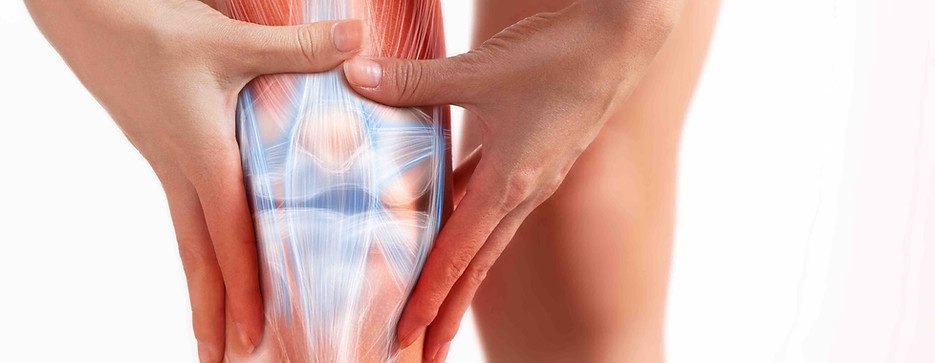
Knee pain often comes in two forms: Traumatic or Chronic.
The knee is a hinge joint, which means it is mostly designed to bend only. When a knee is subject to forces that cause it to twist, the ligaments and tendons that support and protect the knee can become inflamed and painful.
In a traumatic injury, these structures can get torn and the joint capsule that protects the knee can become damaged, creating pain. Traumatic injuries of the knee are relatively easy to solve with a correct assessment, and strengthening programs. Pain that comes on in the knee for no apparent reason is more tricky.
Non traumatic knee pain
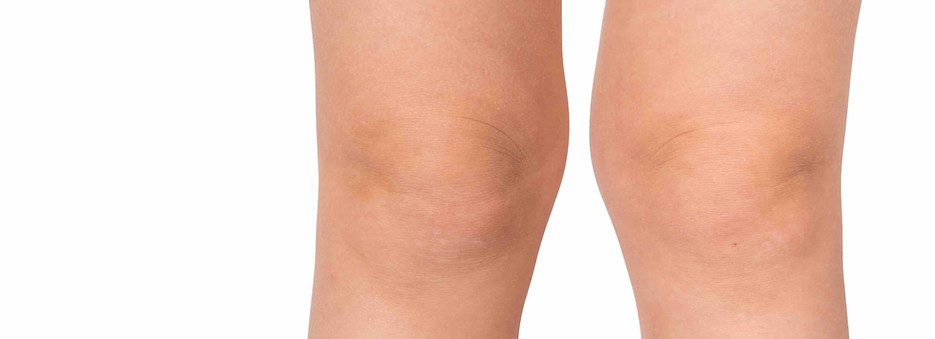
Non traumatic knee pain is usually down to incorrect biomechanics. Although the knee has a small amount of rotation available to it, it is primarily a hinge joint bending and flexing the knee. It relies on staying in a straight position, to allow the muscles to fire properly and the internal structures, such as the cartilage to stay healthy.
The muscles of the knee are heavily reliant on good posture, both at the pelvis and at the foot.
If your foot is weak, for example, this will cause the forces to be greater on the inside of the knee. This is because a weak foot causes the knee to drop inwards. Over time this can irritate both the soft tissue structures and the cartilage, which can start to rub and form the beginnings of Osteoarthtitis. Learn more about osteoarthritis by clicking here.
If your pelvis isn’t straight, if it tips forward, for example, it can create tension in the muscles at the front of the legs, sometimes twisting the kneecap slightly and causing damage and irritation to the cartilage on the back of the kneecap.
How do you treat knee pain?
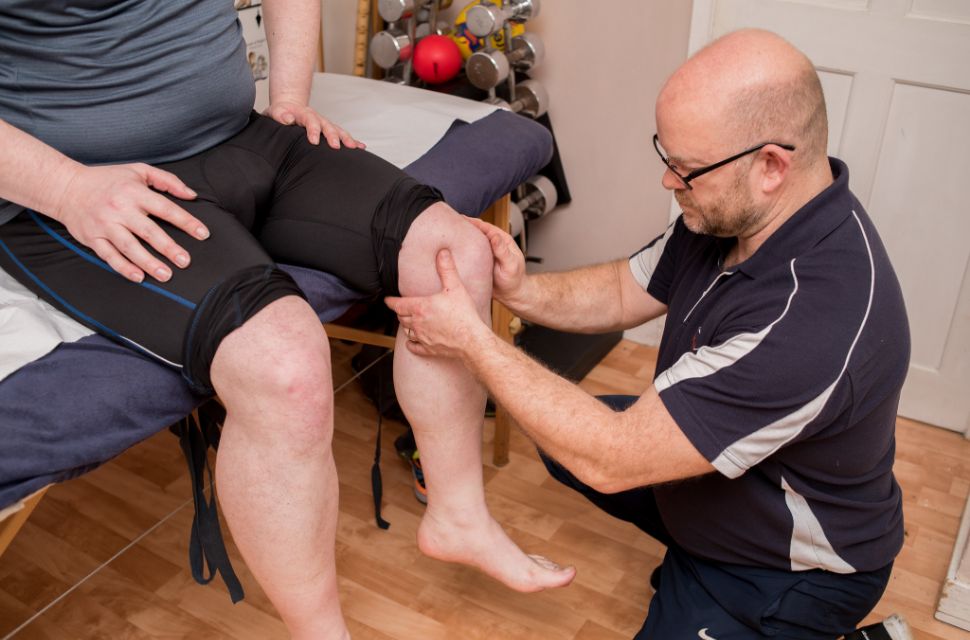
So, how do we treat knee pain?
Well it is relatively simple. The knee likes to be straight, so we will initially assess the both the general knee and kneecap positions. We will check whether the pain is coming from inside the joint or from the muscles around the Knee.
We will also look at your pelvis position and your foot strength. We will even measure the circumference of your legs to check both legs are of a similar size. We will then test the strength of the muscles of whole lower body, to work out where the pain is coming from. At this point we can check whether the firing patterns in the lower body are functioning correctly.
All these checks allow us to understand what is going on in your knee. Then we will know which muscles we need to strengthen and which we need to loosen. With targeted strengthening and loosening, most knee problems go away within a few sessions.
Knee Pain When Running
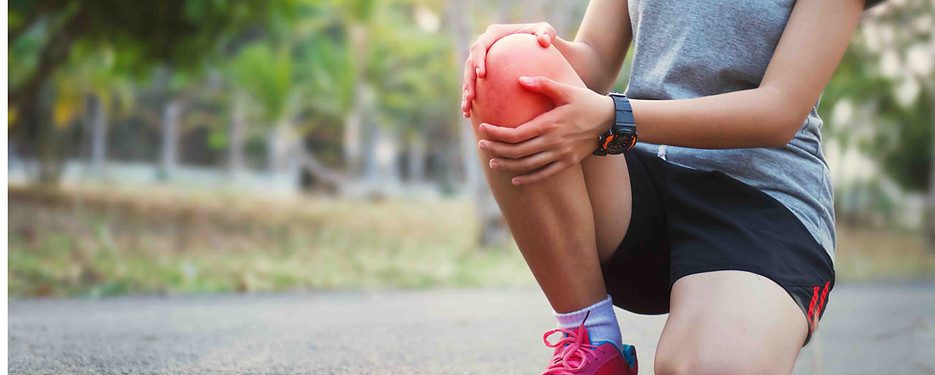
What about knee pain in runners? Knee pain is quite a common complaint for runners and usually this comes from the way your foot hits the floor when you run.
Running creates forces through the knee that are far stronger than the forces you receive when you walk. So any imbalances or weaknesses will show up in the form of pain.
We can usually solve knee pain in runners by completing a running gait assessment. Learn more about our Running Assessments by clicking here.
This allows us to see how you strike the floor when you run and understand where the forces are going. From there we can alter how your run, or restrengthen specific muscles to solve your running pain.
Frequently Asked Questions about Knee Pain
Knee pain when running is usually fixed within 2 or 3 sessions. Our running assessments usually highlight where the problem is on the first session. By the second session most people have considerably less pain and are often completely pain free by the third session.
Occasionally the pain is more complex and may take longer.
Our assessments are very in depth, meaning that we usually get to the root cause of your pain at the first session. As a result we usually fix knee pain within 3 or 4 sessions. However, if the issue is stemming from the foot, it can take a while to strengthen up the foot and therefore it may take longer. However, on these occasions the sessions can be spread out as we are mainly relying on you completing the exercises to solve the problem.
Take a look at the NHS page on knee pain here.
Yes, we have two options for this. If at the assessment we feel some imagery is needed we can write to your GP detailing our findings and requesting a scan or x-ray.
Should you prefer, we can arrange for a private MRI or Ultrasound Scan, or X-Ray. We use Scan.com and other local private Scanning companies for this and a GP referral is not required.
It is very helpful if we can see and feel the muscles around the knee and leg, so we ask you to bring a pair of shortish shorts, or trousers that easily roll up to the hip.
We would never want our clients to feel uncomfortable, so we would work around clothes if we needed to.
Both Physiotherapists and Sports Therapists can assess and treat all types of knee pain, so, at The Reinge Clinic you can choose whichever therapist you are more comfortable with.
Both Ian and Gina are highly experienced at assessing and treating knee pain and have extra training in knee problems due to being APOS Therapy trained. This is higher level training on knee issues such as Osteoarthritis.
What Our Clients Say About Us?
Francis Butt
September 20, 2022
As always, brilliant evaluation, treatment and strategy. Thanks Ian!
Claire Kelley
October 10, 2022
Ian is brilliant at really working to solve the problem. He doesn't rush to get you back but gives you time for set exercises to work and then reassess. Would definitely recommend
Helen Littlewood
October 19, 2022
Totally looked after by Ian - really reassured that he can help and support me in my goals Thank you
Zoe Statters
October 20, 2022
Always upbeat, friendly, offers useful advice & service is always top notch, suggestions and treatments that actually work!
Matt Morrisey
December 8, 2022
EXCELLENT , HELPED ME UNDERSTAND ALL MY ISSUES AND HOW TO START TO RE AJUST
Sonia Chamberlain
September 5, 2023
Gina is a brilliant therapist! Very friendly, supportive and provides a holistic approach to MSK problems.
Megan Thomas
September 5, 2023
Very professional assessment and recommended remedial action that generated far better results than expected. I am as good as new, great work Gina!
Alyson Pettifer
September 5, 2023
Went to see Gina after injuring my ankle and knee. She was very professional and soon got me back on my feet again. I would highly recommend her.
Simon Perkin
September 5, 2023
I was introduced to Gina & Ian, the owners, who are in the process of transferring their long established business in Bristol to Kenilworth in Warwickshire. A few weeks earlier, I had a calf strain & over the years, my calfs have tended to be tight with me pulling my calf 18 months ago & some 10 years or so. Despite this, I have managed to get back, ran a half marathon in 1.29, 5k in sub 20 minutes & represented my country at 5k, 1500m & 800m. I have, however, always worried about calf niggles. I went to see Ian in his impressive Kenilworth practice. He did both a running gait & complete assessment, a bit of treatment & recommended no running for 6 weeks & 2 specific exercises which would take me no more than 10 minutes each day. I did not need to see Ian again but was determined to get back running & preferably injury free. Over the next 6 weeks, I continued with the exercises & started walking. After easing back into the running, I can now confidently report that I have ran 3 park runs in sub 22 minutes, jogged 2 hours & my calfs feel so good. As a precaution, I will book in to see Ian again in the next few days. What I like most about both Gina & Ian is that they are professionals, on your side & wanting to get to the root cause of the real problem; something many other health professionals just don't do. I can fully recommend both Gina & Ian. Thank you for your advice & support.
Joe Parker
September 5, 2023
The clinic has an ethic of finding, treating and eliminating the cause of pain, not just treating the effect. Gina has been tenacious in treating me with regard to my problems, even contacting my GP to initiate further help for me. I have conditions that haven't readily yielded to treatment, but that hasn't deterred Gina who has constantly, and consistently, sought answers and treatments that will work for me. She has stabilised my back problem - Spondylolisthesis - until surgery is carried out. Her work on my right knee has been exemplary. I have no hesitation in recommending her and Ian. Thank you, Gina . . .
Ciprian Ormenisan (Chip)
September 5, 2023
I used The Reinge Clinic to help me with my gait as I was training for the London Marathon. My running technique was all wrong, but with their help, it improved significantly, and I finished my first marathon at the age of 46. The sports massages kept me in top form and free from injuries. I would give them 5 stars and will definitely return to them in the future!
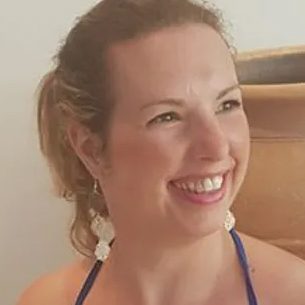
Louise Thorne
August 30, 2023 Reinge Clinic
Due to various injuries from my ankle, to knee to hips, I have gone to see both Gina and Ian over the years, and I can't recommend them enough. They are both lovely and highly professional, and after a period of regular sessions most of my injuries are now ok.